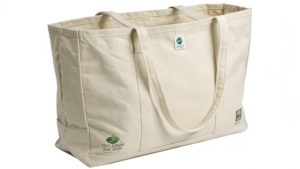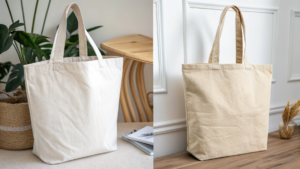Which Water Bottle is Right for Your Lifestyle?
Choosing a water bottle can feel like a big decision. Is it about health benefits or how long it lasts? The real question is, which one fits your daily life better?
The best water bottle for you depends entirely on your lifestyle and priorities. While copper offers traditional health benefits and a mindful approach to hydration, stainless steel provides unmatched durability, insulation, and low maintenance, making it highly practical for today's fast-paced routines.
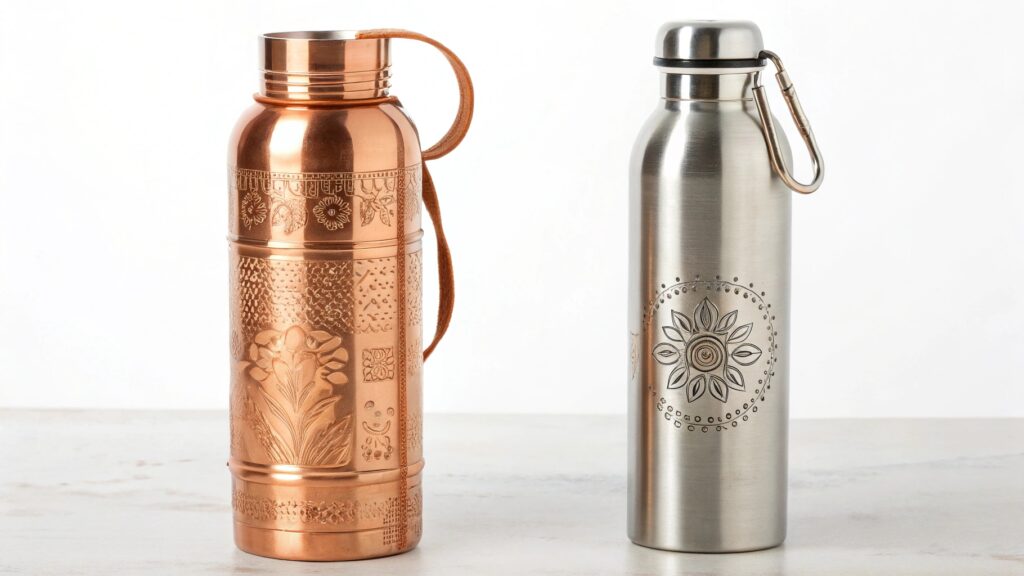
I've learned that the "best" choice is almost never universal. It's like choosing the right material for a corporate gift; what works for one client might not work for another. It really comes down to understanding your needs. This is why I believe the choice of water bottle is deeply personal.
What Are the Disadvantages of Copper Water Bottles?
Are you drawn to the traditional appeal and supposed health benefits of copper water bottles1, but worried about potential drawbacks? Do you wonder if their unique properties come with hidden challenges or specific care requirements?
While copper water bottles offer traditional appeal and potential health benefits, they come with several disadvantages including requiring specific and frequent cleaning to prevent tarnishing and bacterial growth, the risk of copper leaching into water if used improperly or with acidic liquids, and being unsuitable for hot beverages, limiting their versatility.
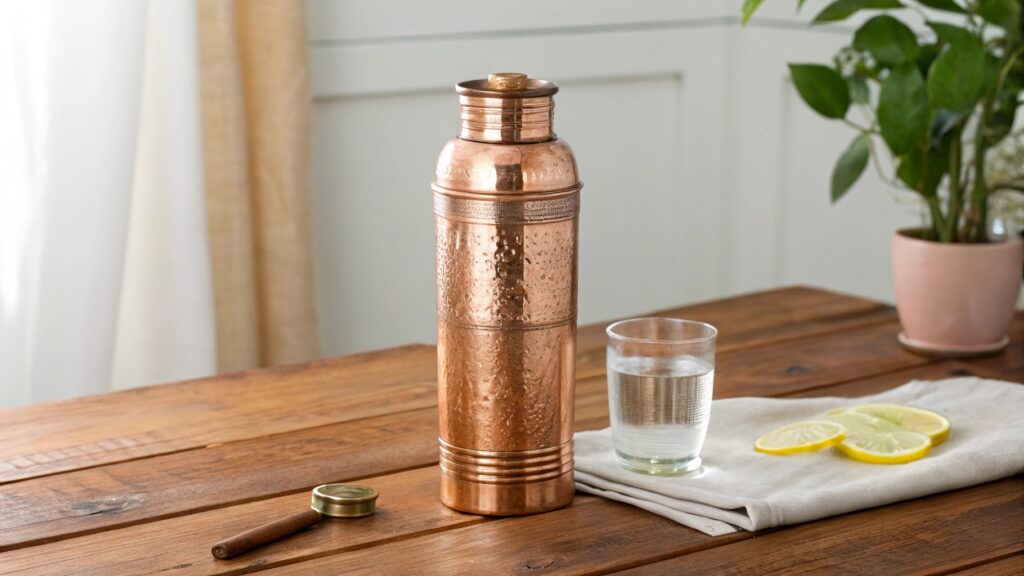
I've seen many trends come and go in the gifting industry. Copper has a certain mystique, but like any material, it has its quirks. This is why it's important to understand the full picture before committing.
Why Do Copper Bottles Need Special Care?
Copper bottles need special care. This is due to their chemical properties. They can tarnish. They can also leach copper. Knowing these issues helps you use them safely. It also helps them last longer.
| Disadvantage | Description | Impact on User Experience | Care Requirement |
|---|---|---|---|
| Tarnishing | Copper reacts with air and moisture, causing a dark discoloration. | Aesthetic appeal diminishes, requires regular cleaning to maintain shine. | Frequent cleaning with lemon and salt or specialized copper cleaner. |
| Leaching | Copper can dissolve into water, especially with acidic liquids. | Excessive copper intake can be harmful; alters water taste. | Only use with plain, room-temperature water; avoid acidic drinks. |
| Not for Hot Drinks | High temperatures can accelerate copper leaching and affect water taste. | Limits versatility for tea, coffee, or hot beverages. | Stick to cold or room-temperature water only. |
| Rusting | If not dried properly, copper can develop verdigris (a green patina). | Can be toxic if ingested, hard to remove once formed. | Must be completely dried after every wash. |
| Durability | Softer metal compared to stainless steel, prone to dents and scratches. | May not withstand rough handling, less suitable for active lifestyles. | Handle with care, avoid dropping or hitting hard surfaces. |
| Weight | Can be heavier than other materials, making it less portable. | Adds to carry weight, especially when full. | Consider portability needs before purchase. |
| Cleaning | Requires specific cleaning agents and methods, not dishwasher safe. | More time-consuming to maintain hygiene. | Hand wash only; avoid harsh chemicals or abrasive scrubbers. |
I once tried using a copper water bottle myself, drawn by the health claims. I quickly learned about the daily ritual of cleaning it to keep it from turning green. I also noticed a slight metallic taste if the water sat for too long. For my fast-paced schedule in Singapore, it became more of a chore than a benefit. This showed me that while the idea was appealing, the practicalities did not always align with my lifestyle. It underscored the importance of understanding the real-world maintenance required for such products.
Which One Is Better, Copper or Stainless Steel?
Are you weighing the pros and cons of copper versus stainless steel water bottles, trying to decide which material offers the most benefits for your daily hydration needs? Do you want a clear comparison to make an informed choice?
The "better" choice between copper and stainless steel water bottles depends entirely on individual priorities. Copper offers traditional health benefits and aesthetic appeal but demands careful maintenance. Stainless steel excels in durability, insulation2, versatility for all temperatures, and low maintenance, making it a highly practical choice for most modern users.
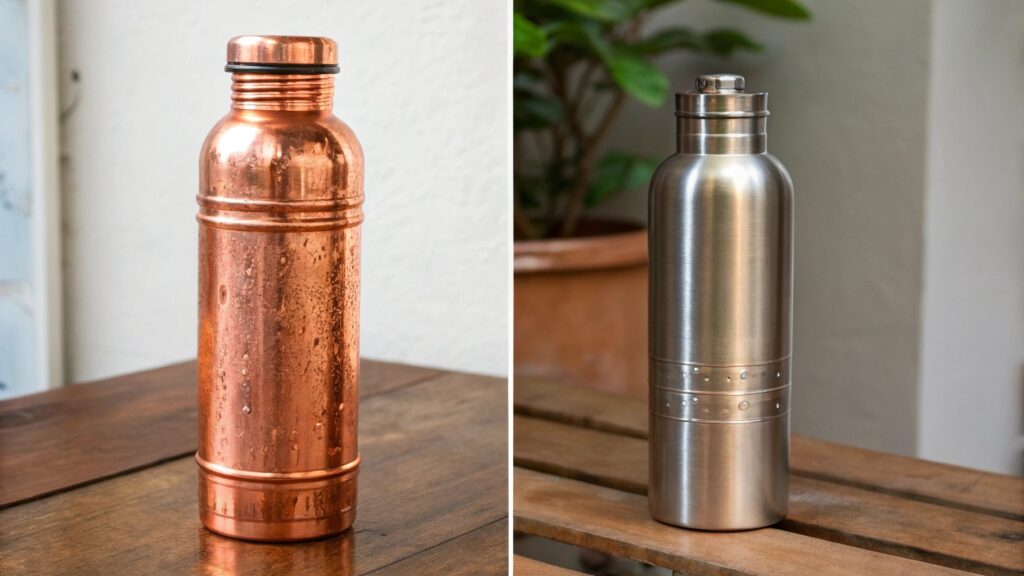
In my experience, "better" is rarely about one single feature. It's about finding the best fit. It's like finding the perfect corporate gift: it needs to align with the recipient's needs and the sender's values. Here is a direct comparison of the two materials.
What are the Pros and Cons of Each Material?
Both copper and stainless steel have strong points. They also have weaknesses. Understanding these helps you choose wisely. It depends on what you value most.
| Feature | Copper Water Bottles | Stainless Steel Water Bottles |
|---|---|---|
| Health Benefits | Ayurvedic claims of water purification, improved digestion. | No specific health claims; inert material. |
| Durability | Softer metal, prone to dents and scratches. | Highly durable, resistant to rust and impact. |
| Insulation | Poor insulator; does not keep water cold or hot for long. | Excellent insulation; keeps drinks cold for hours, hot for hours. |
| Maintenance | Requires frequent cleaning to prevent tarnish and leaching. | Easy to clean, often dishwasher safe, low maintenance. |
| Versatility | Only suitable for plain, room-temperature water. | Safe for hot, cold, and acidic beverages. |
| Taste | Can impart a metallic taste if water sits too long. | No taste transfer; preserves water's natural taste. |
| Weight | Can be heavier than stainless steel options. | Varies, but generally lighter for similar volume. |
| Cost | Often higher due to material and traditional appeal. | Generally more affordable and widely available. |
| Aesthetics | Unique, traditional, develops a natural patina over time. | Modern, sleek, available in various colors and finishes. |
| Eco-friendliness | Natural, recyclable; concerns about mining impact. | Recyclable, widely available; good long-term choice. |
I've personally used both types of bottles. For a while, I loved the idea of the copper bottle and its ancient feel. But the constant cleaning and the inability to put ice water in it made me switch back to stainless steel for daily use. The stainless steel bottle is simply more practical for my busy life in Singapore. I can throw it in my bag, fill it with anything, and it keeps my water cold all day. It became clear that convenience and durability3 were more important to me than the perceived mystical benefits of copper.
What Is the Healthiest Water Bottle to Use?
Are you concerned about your health and seeking the safest possible material for your reusable water bottle? Do you want to avoid harmful chemicals and ensure your hydration habit supports your well-being?
The healthiest water bottle to use is typically one made from food-grade stainless steel or glass, as both materials are inert, do not leach chemicals into your water, and are easy to clean. These options minimize exposure to potential toxins like BPA and phthalates, ensuring your drinking water remains pure and safe for consumption.
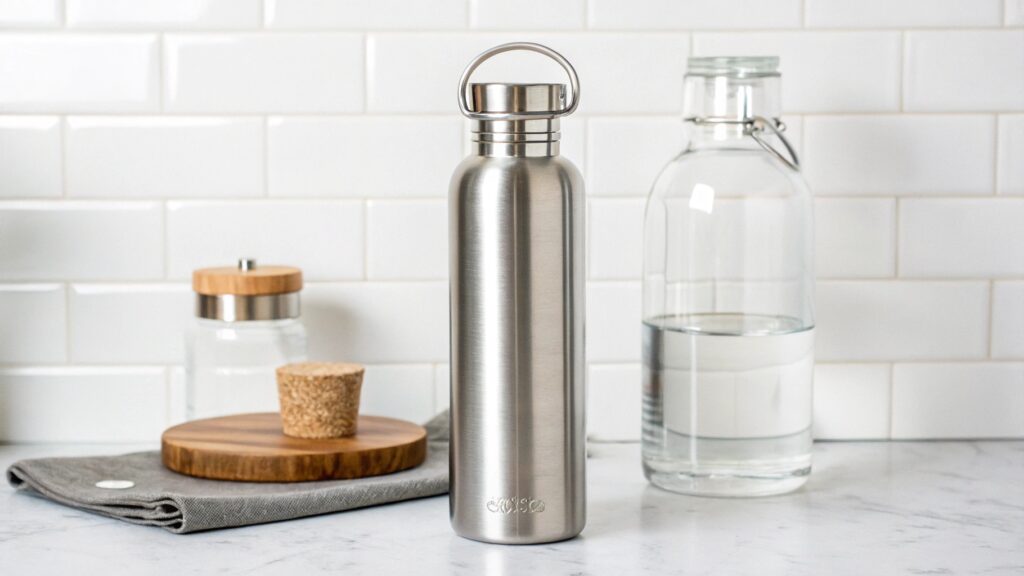
As someone who helps businesses choose safe and high-quality gifts, I know that material safety is paramount. When it comes to personal use, especially for something as fundamental as hydration, choosing a truly healthy option is crucial.
Why Are Some Materials Healthier Than Others?
Some materials are healthier for water bottles. They do not release chemicals. They also do not affect water quality. This keeps your water pure. It also protects your body from harm.
| Material | Health Benefits/Safety | Considerations | Ideal Use |
|---|---|---|---|
| Food-Grade Stainless Steel | Inert, non-leaching, no BPA/phthalates, resistant to bacteria. | Can be heavy when full, opaque so water level is not visible. | Everyday use, hot and cold beverages, active lifestyles. |
| Glass | Purest taste, no leaching, aesthetically pleasing, easy to clean. | Fragile, heavy, can break if dropped. | Home, office, gentle travel, aesthetic appeal. |
| BPA-Free Plastic (Tritan) | Lightweight, durable, shatter-resistant, affordable, no BPA. | While BPA-free, some concerns about other chemicals; can retain odors. | Sports, travel, children's bottles, budget-friendly option. |
| Silicone | Flexible, lightweight, non-toxic, heat-resistant, can be collapsible. | Can sometimes impart a subtle taste, less rigid. | Travel, camping, portability, for cold or warm liquids. |
| Copper | Traditional Ayurvedic claims of antimicrobial properties; trace mineral intake. | Leaching concerns with acidic liquids, tarnishing, not for hot drinks. | Specific traditional practices, room-temperature plain water only. |
| Aluminum | Lightweight, durable. | Often lined with epoxy, which may contain BPA; can dent easily. | Budget-friendly, travel (if verified BPA-free lining). |
When I research materials for corporate gifts, especially those that come into contact with food or drink, safety is my top priority. I always recommend food-grade stainless steel or glass for clients who prioritize health and longevity. For instance, we sourced high-quality stainless steel bottles for a health and wellness company here in Singapore. They specifically wanted bottles that were inert and easy to clean. The feedback was overwhelmingly positive. Clients appreciated the quality and the peace of mind. This reinforced my belief that for general hydration, these materials are indeed the healthiest choice.
Conclusion
Choosing between copper and stainless steel water bottles depends on what you value. Copper offers unique traditions but needs careful care. Stainless steel is practical, durable, and versatile for modern life.



